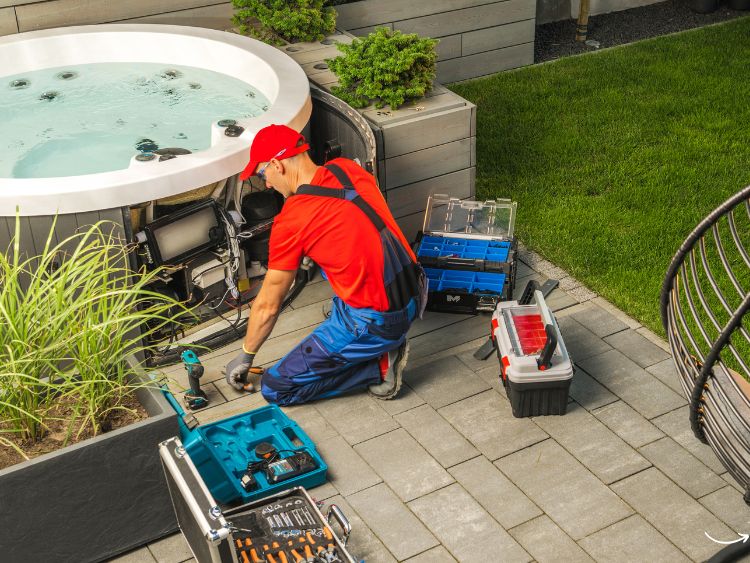Ah, the joy of owning a pool! Whether it’s a scorching summer day or a relaxing evening, your pool can be a sanctuary of fun and relaxation. But hold on a second, is your pool as inviting as it should be? If maintaining your pool seems like a daunting task, worry not! With regular weekly pool maintenance, you can keep your pool in tip-top shape without breaking a sweat. In this guide, we’ll walk you through everything you need to know about weekly pool maintenance. From skimming leaves to balancing chemicals, we’ve got you covered.
Why Weekly Pool Maintenance is Essential
Maintaining a pool isn’t just about keeping the water clean; it’s about ensuring the entire system works efficiently. Neglecting regular maintenance can lead to a myriad of problems, including algae growth, cloudy water, and even damage to your pool equipment. By dedicating a bit of time each week, you can avoid costly repairs and enjoy a pristine swimming experience.
Benefits of Regular Maintenance
- Health and Safety: Clean water prevents the growth of harmful bacteria and algae.
- Prolongs Equipment Life: Regular checks help detect potential issues early.
- Cost-Effective: Preventive maintenance can save you from expensive repairs.
- Aesthetic Appeal: A clean pool is more inviting and enjoyable.
Getting Started with Weekly Pool Maintenance
Tools You’ll Need
Before diving into the nitty-gritty of pool maintenance, make sure you have the right tools on hand:
- Skimmer net
- Pool brush
- Pool vacuum
- Water testing kit
- Chemicals (chlorine, pH increaser/decreaser, algaecide)
- Protective gloves and goggles
Weekly Pool Maintenance Checklist
1. Skimming the Surface
Leaves, bugs, and other debris can quickly accumulate on the surface of your pool. Using a skimmer net, remove these floating items daily to keep your pool clean.
2. Brushing the Walls and Floor
Algae and dirt can cling to the walls and floor of your pool. Brush these surfaces at least once a week to prevent buildup. Pay special attention to corners and crevices where algae tend to hide.
3. Vacuuming the Pool
After brushing, vacuum your pool to remove the debris that has settled on the bottom. There are manual and automatic pool vacuums available. Choose one that suits your needs and budget.
4. Checking and Cleaning the Filter
Your pool filter plays a crucial role in keeping the water clean. Depending on the type of filter (sand, cartridge, or diatomaceous earth), clean it according to the manufacturer’s instructions. Generally, this should be done every one to two weeks.
5. Testing the Water
Use a water testing kit to check the chemical levels in your pool. Key parameters to monitor include:
- Chlorine Levels: Should be between 1.0 and 3.0 ppm.
- pH Levels: Should be between 7.2 and 7.6.
- Alkalinity: Should be between 80 and 120 ppm.
- Calcium Hardness: Should be between 200 and 400 ppm.
Adjust the chemical levels as needed to keep your water balanced. This will prevent issues like cloudy water, algae growth, and skin irritation.
6. Adding Chemicals
Based on your water test results, add the necessary chemicals to balance the water. Always follow the manufacturer’s instructions and wear protective gear when handling pool chemicals.
7. Inspecting Pool Equipment
Check your pool pump, heater, and other equipment for any signs of wear or damage. Regular inspections can help you catch problems early and avoid costly repairs.
FAQs About Weekly Pool Maintenance
How often should I check my pool’s water levels?
You should check your pool’s water levels at least once a week. The water level should be halfway up the skimmer opening. Low water levels can damage the pump, while high levels can affect the skimming process.
Can I use household cleaning products for my pool?
No, you should never use household cleaning products in your pool. These products can disrupt the chemical balance and damage your pool surfaces and equipment. Always use pool-specific chemicals.
What should I do if my pool water is cloudy?
Cloudy water can be caused by several factors, including improper chemical balance, poor filtration, or algae growth. Start by testing and adjusting your water chemistry. If the problem persists, clean your filter and consider shocking the pool.
How do I prevent algae growth?
To prevent algae growth, maintain proper chlorine levels, brush and vacuum your pool regularly, and use an algaecide as part of your weekly maintenance routine.
Is it necessary to hire a professional for weekly pool maintenance?
While hiring a professional can save you time and ensure your pool is properly maintained, many pool owners can handle weekly maintenance tasks themselves with the right tools and knowledge.
Conclusion
Weekly pool maintenance might seem like a chore, but with a structured routine, it can become a simple and rewarding process. By dedicating a bit of time each week, you can keep your pool sparkling clean, safe, and inviting. Remember, consistency is key! So grab your skimmer net, test those waters, and dive into a hassle-free pool maintenance routine. Happy swimming!
Authoritative Links
- https://www.cdc.gov/healthywater/swimming/index.html
- https://www.epa.gov/sites/production/files/2014-08/documents/poolsafety.pdf
- https://www.poolandspa.com/
- https://www.swimuniversity.com/
- https://www.poolcareguy.com/
- https://www.troublefreepool.com/
By following this guide and incorporating these tips into your routine, you’ll ensure your pool remains a delightful oasis all season long. Dive in and enjoy the clear, clean waters of your well-maintained pool!




